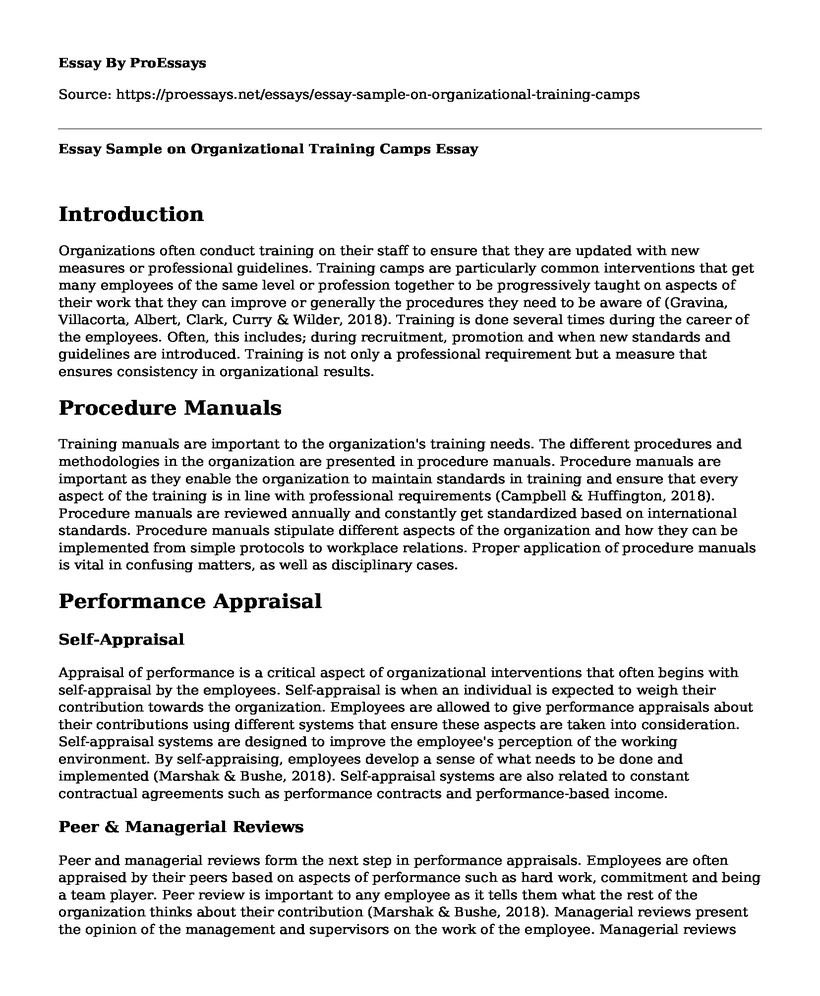Introduction
Organizations often conduct training on their staff to ensure that they are updated with new measures or professional guidelines. Training camps are particularly common interventions that get many employees of the same level or profession together to be progressively taught on aspects of their work that they can improve or generally the procedures they need to be aware of (Gravina, Villacorta, Albert, Clark, Curry & Wilder, 2018). Training is done several times during the career of the employees. Often, this includes; during recruitment, promotion and when new standards and guidelines are introduced. Training is not only a professional requirement but a measure that ensures consistency in organizational results.
Procedure Manuals
Training manuals are important to the organization's training needs. The different procedures and methodologies in the organization are presented in procedure manuals. Procedure manuals are important as they enable the organization to maintain standards in training and ensure that every aspect of the training is in line with professional requirements (Campbell & Huffington, 2018). Procedure manuals are reviewed annually and constantly get standardized based on international standards. Procedure manuals stipulate different aspects of the organization and how they can be implemented from simple protocols to workplace relations. Proper application of procedure manuals is vital in confusing matters, as well as disciplinary cases.
Performance Appraisal
Self-Appraisal
Appraisal of performance is a critical aspect of organizational interventions that often begins with self-appraisal by the employees. Self-appraisal is when an individual is expected to weigh their contribution towards the organization. Employees are allowed to give performance appraisals about their contributions using different systems that ensure these aspects are taken into consideration. Self-appraisal systems are designed to improve the employee's perception of the working environment. By self-appraising, employees develop a sense of what needs to be done and implemented (Marshak & Bushe, 2018). Self-appraisal systems are also related to constant contractual agreements such as performance contracts and performance-based income.
Peer & Managerial Reviews
Peer and managerial reviews form the next step in performance appraisals. Employees are often appraised by their peers based on aspects of performance such as hard work, commitment and being a team player. Peer review is important to any employee as it tells them what the rest of the organization thinks about their contribution (Marshak & Bushe, 2018). Managerial reviews present the opinion of the management and supervisors on the work of the employee. Managerial reviews are important as they determine how well the employee is regarded by their superiors. These reviews often get more consideration than the peer and the self-reviews.
Comparing and Contrasting the Interventions
Similarities
Training and appraisals have several similarities that can be attributed to the interventions. Training is done by senior staffers who are aware of the intricacies of the organization and have been working in the company for a long period of time. Appraisals are also done by other staffers in the organization. It is a team effort similar to the training intervention. Training and appraisals are both precursors to promotion (Campbell & Huffington, 2018). Good performance appraisal can lead to the employee being promoted at the workplace. Training is also required when a person is being promoted so that they can be informed about the new roles they are expected to take up.
Differences
Training often comes before performance appraisal. The employee needs to be trained before they can be appraised on how they are performing in their hired roles. Performance appraisals are practically concerned with all aspects of the employee such as character, understanding of job roles and even attitude towards work. Training is specific to the role of the individual. An accountant, for instance, will be trained on finances while a human resource employee will be trained in human psychology (Gravina et al., 2018).
References
Campbell, D., & Huffington, C. (2018). Introduction: Six stages of systemic consultation. In Organizations Connected (pp. 1-14). Routledge. Retrieved from http://repository.tavistockandportman.ac.uk/68/1/Campbell_%26_Huffington__Introduction.pdf
Gravina, N., Villacorta, J., Albert, K., Clark, R., Curry, S., & Wilder, D. (2018). A literature review of organizational behavior management interventions in human service settings from 1990 to 2016. Journal of Organizational Behavior Management, 38(2-3), 191-224. Retrieved from https://www.researchgate.net/profile/Nicole_Gravina/publication/324248454_A_Literature_Review_of_Organizational_Behavior_Management_Interventions_in_Human_Service_Settings_from_1990_to_2016/links/5ac7a5934585151e80a3b32f/A-Literature-Review-of-Organizational-Behavior-Management-Interventions-in-Human-Service-Settings-from-1990-to-2016.pdf
Marshak, R. J., & Bushe, G. R. (2018). Planned and generative change in organization development. OD Practitioner, 50(4), 10. Retrieved from https://beedie.sfu.ca/sms/admin/_DocLibrary/_ic/28d56dd43d08c4047dca255aab642028.pdf
Cite this page
Essay Sample on Organizational Training Camps. (2022, Dec 16). Retrieved from https://proessays.net/essays/essay-sample-on-organizational-training-camps
If you are the original author of this essay and no longer wish to have it published on the ProEssays website, please click below to request its removal:
- Impacts of Changing World Order on Capital Asset Pricing Model's Main Assumptions
- IKEA: Making Life Better for the World's Many People Essay
- Research Paper on Corporate Governance Disclosures by Banks in Singapore
- Risk Management and Insurance Essay Example
- Strengthening Household Appliances Supply Chain Risk Management - Essay Sample
- Essay on Privacy & Security: A Closer Look at the Rights and Protections
- Free Paper Example on Balanced Scorecard Strategies for Global Competitiveness







